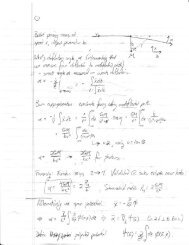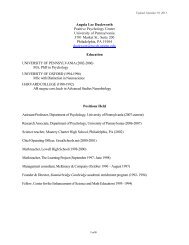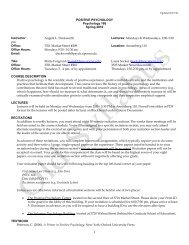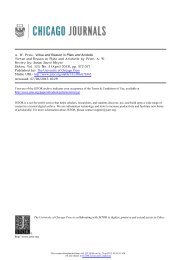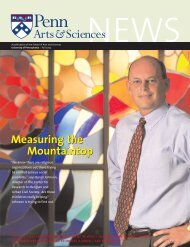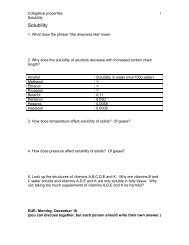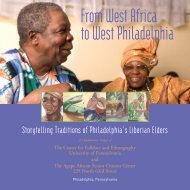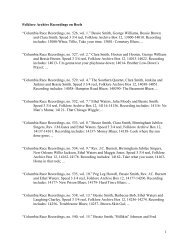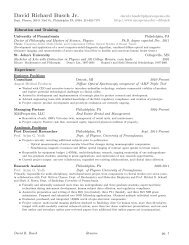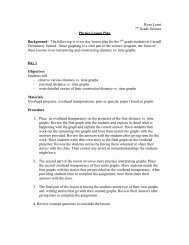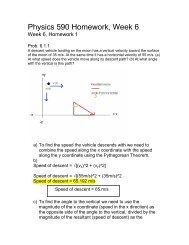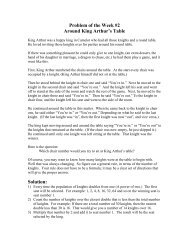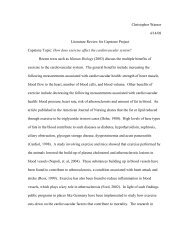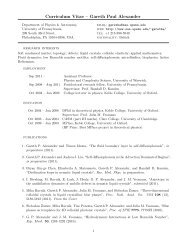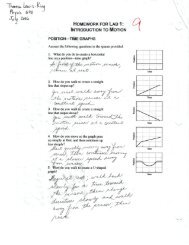Robinson Woodward-Burns - School of Arts & Sciences
Robinson Woodward-Burns - School of Arts & Sciences
Robinson Woodward-Burns - School of Arts & Sciences
Create successful ePaper yourself
Turn your PDF publications into a flip-book with our unique Google optimized e-Paper software.
Violence and Moral Suasion in David Walker’s Appeal<br />
<strong>Robinson</strong> <strong>Woodward</strong>-<strong>Burns</strong><br />
David Walker’s Appeal, an 1829 antislavery pamphlet, calls for abolition through<br />
both violent slave revolt and persuasion <strong>of</strong> slaveholders. Insurrectionism and<br />
suasionism were conflicting schools <strong>of</strong> abolition in Walker’s time, but Walker<br />
asserts that violence is a type <strong>of</strong> persuasion. He claims slaveholders intuit that<br />
blacks are human, but given slaves’ subservience, slaveholders have no evidence<br />
to confirm this intuition. Revolt proves to whites that backs are not natural slaves.<br />
Since Walker’s argument for resistance relies on convincing whites slaveholders,<br />
Walker merges suasionism and insurrection.<br />
David Walker’s 1829 Appeal was an incendiary call for violent abolition <strong>of</strong> slavery. The<br />
pamphlet shifted black abolitionism from suasion and negotiation with slaveholders to radical<br />
insurrectionism, pushing the nation to war. Puzzlingly, the pamphlet merged moderate moral<br />
suasion with insurrectionism, asserting violence was a kind <strong>of</strong> suasion. Despite its importance,<br />
the pamphlet has received little scholarly appeal. The aim <strong>of</strong> this essay is to elucidate Walker’s<br />
claim slave insurrection is will persuade a rational audience that slavery is wrong.<br />
Given Walker’s obscurity, some background is helpful. Born a free African American in<br />
1796 or 1797, Walker was raised in Wilmington, North Carolina. Little is known <strong>of</strong> Walker’s<br />
boyhood, but he was likely raised among Wilmington’s slaves (Hinks, 20). Wilmington’s slave<br />
community had a history <strong>of</strong> resistance, aiding the British in sacking the city in 1781, and forming<br />
a raiding posse <strong>of</strong> runaways the year before Walker’s birth. Around 1820 Walker moved to<br />
Charleston, South Carolina, the third-largest community <strong>of</strong> Southern free blacks, where he<br />
worshipped with slaves in the African Methodist Episcopal church. The congregation was “A<br />
glaring symbol <strong>of</strong> black resistance to white hegemony…a constant reminder to all blacks <strong>of</strong> how<br />
they might seek out freedom together” (Hinks, 28). Sermons on biblical deliverance from slavery<br />
riled whites, forcing the church underground. At this time Denmark Vesey also organized local
clandestine meetings to agitate slave revolt. Vesey, once discovered, made a public appeal for<br />
revolt that foreshadowed Walker’s own (Wilentz, ix-x; Hinks, 29-30). Walker moved to Boston<br />
by 1825, where he joined black intellectual and church communities and biracial abolitionist<br />
circles. He backed the first black abolitionist periodical, Freedom’s Journal, contributing several<br />
articles before publishing the 1829 Appeal. He died suddenly in 1830 after releasing a third<br />
edition <strong>of</strong> the pamphlet.<br />
The Appeal demands slave revolt. Walker opens with the conviction “we, (coloured<br />
people <strong>of</strong> these United States,) are the most degraded, wretched, and abject beings that ever lived<br />
since the world began” (Walker, 1). He traces blacks’ misery to four causes, each addressed in a<br />
separate article <strong>of</strong> the pamphlet. First is slavery, buttressed by Jefferson’s assertion blacks are<br />
innately inferior. Second is blacks’ ignorance in accepting Jefferson’s claim that slavery is their<br />
natural station. Third are preachers who teach slaves servitude is a Christian virtue, and fourth<br />
are colonization societies that deport free blacks to Haiti or Liberia. In each case, blacks’<br />
wretchedness reflects their circumstances, not their nature, which Walker asserts is nearly<br />
identical to that <strong>of</strong> whites. The Appeal calls on blacks to prove this equality through education<br />
and social uplift. So ingrained is servitude in the black mind that Walker doubts education will<br />
succeed. He asserts violent resistance will prove to blacks and whites that the races are equal.<br />
The Appeal polarized America. Walker encouraged the Appeal’s spread in the South,<br />
where he felt it most needed, to the irritation <strong>of</strong> Southern legislatures. The pamphlet changed<br />
hands between black sailors, issuing from ports in tidewater Virginia, Wilmington, Charleston,<br />
Savannah, and New Orleans. Louisiana, grappling with a series <strong>of</strong> slave revolts, banned printing<br />
incendiary slave literature, and New Orleans police seized the pamphlet and its distributors.<br />
Police in Wilmington and Charleston did the same. At the order <strong>of</strong> the Georgia state legislature,
Savannah port authorities quarantined vessels manned by blacks and threatened black sailors<br />
with arrest for going ashore (Easton, 327-330). Still, the pamphlet snaked inland with runaways<br />
and itinerant preachers. The latter particularly concerned North Carolina’s governor, John Floyd,<br />
who blamed the pamphlet for the region’s slave resistance (Hinks, 116-172). Confirming his<br />
fears, suspected resistance conspirators were found in North Carolina with the essay. Growing<br />
fear <strong>of</strong> slave revolts, exacerbated by the pamphlet, united white yeomen and plantation barons<br />
alike against Walker and abolitionists (Wilentz, xx).<br />
Abolitionists warmed to the Appeal gradually. Even Boston abolitionists initially doubted<br />
Walker, favoring persuasion <strong>of</strong> slaveholders – called moral suasion – or at least compensated<br />
emancipation. William Lloyd Garrison, for example, criticized Walker’s radicalism. Yet Garrison<br />
defended Walker against charges <strong>of</strong> plagiarism, and eventually adopted Walker’s call for<br />
immediate abolition, hoping to ingratiate himself to Boston blacks (Aptheker, 50-52; Hinks, 112-<br />
113). Garrison’s Liberator articles popularized Walker’s radicalism among white abolitionists,<br />
while black abolitionists like Henry Highland Garnet spread his message <strong>of</strong> revolution through<br />
the free black communities <strong>of</strong> the northwest. Walker’s pamphlet marks a turn from the moderate<br />
abolitionism <strong>of</strong> the early-1800’s to the confrontational tone <strong>of</strong> antebellum antislavery (Crockett,<br />
305-307). Walker’s Appeal so aggravated the divide over slavery, historian Sean Wilentz credits<br />
it as a primary cause <strong>of</strong> the Civil War (Wilentz, xxii-xxiii).<br />
Given Walker catalyzed the Civil War, there is a surprising dearth <strong>of</strong> scholarship on his<br />
pamphlet. Work on Walker is limited to several books and a dozen articles. Most Walker<br />
scholarship is historical, recounting Walker’s life, the distribution <strong>of</strong> his pamphlet, and the<br />
reaction among slaveholders and moderate and radical abolitionists. Few analyze Walker’s text –<br />
Herbert Aptheker, Peter Hinks, and Rufus Burrow give admirable exegeses – and only Darryl
Scriven approaches Walker as a philosopher. However, even Scriven takes the conventional view<br />
<strong>of</strong> Walker as an anti-suasionist, missing Walker’s provocative combination <strong>of</strong> violence and moral<br />
suasion.<br />
This essay expounds Walker’s claim that violence and persuasion are compatible. In<br />
doing so, the essay makes three contributions. First, it poses Walker as a political thinker, adding<br />
to the Walker literature. Second, it resolves an apparent tension between Walker’s advocacy <strong>of</strong><br />
abolition through both violent insurrection and through moral persuasion <strong>of</strong> slaveholders. Third,<br />
in showing the two approaches are compatible, the essay questions the traditional tension<br />
between these two schools <strong>of</strong> abolitionism.<br />
The paper proceeds in three steps. First it recounts Walker objection to Jefferson’s<br />
argument <strong>of</strong> natural black inferiority. In the second section, Walker demonstrates violence is the<br />
only way blacks can refute Jefferson. Finally, the paper shows why violent resistance is a kind <strong>of</strong><br />
moral suasion. Slaveholders intuit that if slaves are human, they will resist their bondage.<br />
Resistance confirms whites’ intuition, and it is this appeal to intuition that makes Walker’s<br />
argument a type <strong>of</strong> suasion.<br />
I. Walker and Jefferson on Race<br />
The Appeal contests Jefferson’s claim blacks are innately inferior, so it is worth<br />
interrogating Jefferson on race. In Query XIV <strong>of</strong> Jefferson’s 1785 Notes on the State <strong>of</strong> Virginia,<br />
Jefferson digresses on potential post-colonial legal reforms in Virginia, including a bill for<br />
deportation <strong>of</strong> emancipated slaves. He justifies this colonization plan by asserting coexistence <strong>of</strong><br />
blacks and whites, given mutual resentment, would “produce convulsions which will probably<br />
never end but in the extermination <strong>of</strong> one or the other race” (Jefferson, 264). This would be<br />
exacerbated by “the real distinctions which nature has made” between the races – blacks’
physiological and intellectual inferiority. Jefferson asserts blacks lack whites’ physiological<br />
blessings, “the flowing hair [and] symmetry <strong>of</strong> form” <strong>of</strong> whites, revealed by blacks’ “own<br />
judgment in favour <strong>of</strong> the whites, declared by their preference for them, as uniformly as is the<br />
preference <strong>of</strong> the Oranootan for the black woman over those <strong>of</strong> his own species” (Ibid, 265).<br />
Jefferson’s point is not to link blacks and orangutans, but to place blacks in a hierarchy <strong>of</strong><br />
species, below whites and above apes (Scriven, 44). This hierarchy assumes physical differences<br />
between races are innate, not merely environmental.<br />
Jefferson posits two arguments on why blacks’ intellectual inferiority is also innate. First,<br />
African Americans, living in proximity to whites for nearly two centuries, could have developed<br />
arts and sciences akin to those <strong>of</strong> whites. He sees no evidence <strong>of</strong> this. Even thoroughly-educated<br />
black intellectuals reveal their inferiority: Phyllis Wheatley and Ignatius Sancho are “wild and<br />
extravagant” in their prose; the latter “escapes incessantly every restraint <strong>of</strong> reason and taste.”<br />
That black intellectuals tend to poetry and music, rather than the sciences, shows their<br />
disposition to “sensation [rather] than reflection.” Indians, however, in frequent contact with<br />
whites, can reason, abstracting from a natural object to an artistic representation <strong>of</strong> the object.<br />
Presumably, they stand higher on the ladder <strong>of</strong> human species. Second, Jefferson lauds the<br />
intellectual achievements <strong>of</strong> Roman slaves. He claims “the condition <strong>of</strong> [these] slaves was much<br />
more deplorable than that <strong>of</strong> the blacks on the continent <strong>of</strong> America,” as Roman slaves were<br />
segregated by gender and could be easily tortured or put to death. Yet Roman slaves excelled in<br />
the arts and sciences. The luminaries “Epictetus, Terence, and Phaedrus, were slaves. But they<br />
were <strong>of</strong> the race <strong>of</strong> whites” (Jefferson, 267-268). Whites’ nature trumps environment.<br />
Jefferson allows a caveat. Among black slaves he sees the propensity to steal goods from<br />
their master, which he admits is fair, given they have so little. This “must be ascribed to their
situation, and not to any depravity <strong>of</strong> the moral sense” (Ibid, 269). Unlike blacks’ outward<br />
physiology, their intellectual and moral character is difficult to observe, and complicated by such<br />
counterexamples. Lacking systematic study <strong>of</strong> blacks, Jefferson is thus reluctant to “degrade a<br />
whole race <strong>of</strong> men from the rank <strong>of</strong> the scale <strong>of</strong> beings which their Creator may perhaps have<br />
given them…I advance it as a suspicion only, that the blacks, whether originally a distinct race,<br />
or made distinct by time and circumstances, are inferior to the whites” (emphasis added, Ibid,<br />
270). Lacking adequate evidence, Jefferson invites falsification <strong>of</strong> his theory.<br />
The first and pivotal article <strong>of</strong> Walker’s Appeal refutes Jefferson by asserting blacks’<br />
inferiority reflects their environment, not their nature. Walker never questions blacks’ inferiority,<br />
but in tracing blacks’ wretchedness to slavery, he excuses blacks <strong>of</strong> their shortcomings. Walker<br />
attacks Jefferson’s physiological argument on two grounds. First, he rejects blacks descend<br />
“originally from tribes <strong>of</strong> Moneys or Orang-Outangs” (Walker, 10). Though Walker that<br />
misreads Jefferson as asserting blacks evolve from apes, such ideas were common in antebellum<br />
American, and Walker is correct that Jefferson places blacks closer to apes than whites (Scriven,<br />
43-44). Walker answers Jefferson’s contrast between whites and blacks is “like putting one wild<br />
deer in an iron cage, where it will be secured, and hold another by the side <strong>of</strong> the same, then let it<br />
go, and expect the one in the cage to run as fast as the one at liberty;” Jefferson’s argument<br />
requires one ignore blacks’ environment. Second, Walker <strong>of</strong>fers a more explicitly physiological<br />
argument. Jefferson lists blacks’ physical differences from whites, including their skin, hair, and<br />
sweatiness. Walker responds these are superficial, given essential similarities across races: “God<br />
has been pleased to give us two eyes, two hands, two feet, and some sense in our heads as well as<br />
they” (Walker, 11n). Walker’s point is not merely that the races are physically similar, but that to<br />
degrade a race <strong>of</strong> men is to degrade the rank and design which, in Jefferson’s words “their
Creator may perhaps have given them.” Walker’s theology and Jefferson’s deism overlap here:<br />
both are reluctant to damn the craftsmanship <strong>of</strong> God. Walker reiterates the point: whites and<br />
blacks face the same bodily infirmities and the same death. “I ask you, O my brethren! Are we<br />
MEN? Did our Creator make us to be slaves to dust and ashes like ourselves? Are [whites] not<br />
dying worms as well as we...Have we any other master but Jesus Christ alone? Is he not their<br />
Master as well as ours? – What right then, have we to obey and call any other Master, but<br />
Himself?” (Ibid, 16). Noting God made men to suffer alike, Walker affirms Jefferson’s<br />
skepticism that God created different ranks <strong>of</strong> men.<br />
Walker asserts intellect is not innate, but shaped by environment. Black slaves, Walker<br />
asserts, face greater hurdles than their white Roman and Spartan counterparts, explaining black’s<br />
cultural shortcomings. Unlike Spartan helots, black slaves are split from their families and traded<br />
as commodities. Similarly, “slavery as it existed among the Romans…was, comparatively<br />
speaking, not more than a cypher, when compared to ours under the Americans” (Ibid, 14).<br />
Roman slaves could buy their freedom, mix with the free population, and even serve in <strong>of</strong>fice.<br />
Walker cites laws against compensated emancipation for blacks, and Virginia and North Carolina<br />
statutes against black <strong>of</strong>fice-holding. The harshness <strong>of</strong> American slavery explains African<br />
Americans’ intellectual shortcomings relative to the Romans and Spartans. Free Africans,<br />
however, thrived. Walker cites the Egyptians’ engineering and Hannibal’s military exploits,<br />
concluding: “the sons <strong>of</strong> Africa or <strong>of</strong> Ham, among whom learning originated, and was carried<br />
thence into Greece, where it was improved upon and refined. Thence among the Romans, and all<br />
over the then enlightened parts <strong>of</strong> the world” (Ibid, 19).<br />
II. Proving Equality through Violent Resistance
Walker challenges blacks to refute Jefferson. The Appeal intones “Mr. Jefferson’s<br />
remarks respecting us, have sunk deep into the hearts <strong>of</strong> millions <strong>of</strong> the whites.” Blame lies not<br />
only with Jefferson, but also with subservient blacks “confirming him every day, by our<br />
groveling submissions and treachery” (Ibid, 28). To prove to Americans, black and white, that<br />
blacks are not subhuman, blacks must struggle for their natural rights. Is it “unfortunate for us<br />
that our Creator has been pleased to make us black[?]” Walker asks. “We will not take<br />
[Jefferson’s] say so, for the fact. The world will have an opportunity to see whether it is<br />
unfortunate for us, that our Creator has made us darker than whites…we shall have to contend<br />
for our lawful right; guaranteed to us by our Maker” (Ibid, 12).<br />
Walker posits two ways blacks can prove themselves. First, blacks might educate<br />
themselves. Granting the difficulty <strong>of</strong> this, he avers “our oppression ought not to hinder us from<br />
acquiring all we can. For we will have a chance to develope [our talents] by and by.” Such<br />
reform can only come gradually. Second, blacks can use violence. Suicide demonstrates blacks<br />
would rather die than serve (Ibid, 14-15). Slave revolts are another pro<strong>of</strong>. In reversing their<br />
bondage, blacks can show submission is not in their nature. “How would [whites] like for us to<br />
make slaves <strong>of</strong>, and hold them in cruel slavery, and murder them as they do us?” (Ibid, 12).<br />
Walker later expounds “whites have had us under them for more than three centuries, murdering,<br />
and treating us like brutes; and as Mr. Jefferson said, they have never found us out – they do not<br />
know, indeed, there is an unconquerable disposition in the breast <strong>of</strong> the blacks,” only revealed<br />
through rebellion (Ibid, 25).<br />
It is worth considering education and revolt. Walker doubts education can dissuade blacks<br />
<strong>of</strong> their inferiority. Access to education is difficult – Walker cites Virginia and Georgia statues<br />
proscribing blacks, free and slave, from learning to read, write, or worship (Ibid, 53). Further,
many blacks think servility is their natural role, rejecting learning. Walker illustrates several<br />
cases <strong>of</strong> this belief, which he dubs ignorance. He cites a rebellion <strong>of</strong> sixteen slaves being driven<br />
through Kentucky. Having filed <strong>of</strong>f their cuffs in secret, the slaves overpowered their drivers,<br />
killing two and leaving the third for dead. However, a slave from the chain gang helped the<br />
remaining driver mount his horse, draw a posse, and recapture the escapees. Walker rejects the<br />
slave acted from charity or Christian love for the driver, but rather from her reluctance to seize<br />
her freedom, and the violence and independence it entailed (Ibid, 23-25). In another case <strong>of</strong><br />
ignorance, Walker recalls meeting a free shoeshine who claimed he was glad merely to own his<br />
labor. Walker understands this – he was grateful to own his small clothing store – but Walker<br />
condemns him for not imagining more for himself or his race. He asks free blacks to look<br />
forward “with thankful hearts to higher attainments than wielding the razor and cleaning boots<br />
and shoes… your full glory and happiness as well as all other coloured people under Heaven,<br />
shall never be fully consummated, but with the entire emancipation <strong>of</strong> your enslaved brethren all<br />
over the world” (Ibid, 29). Lest one think such “higher attainments” include education in the arts<br />
and sciences, Walker asserts the opposite. Education spawns egoism and avarice in the<br />
individual, directing him to petty aims rather than his own uplift or that <strong>of</strong> the race. Walker<br />
recalls a final example, meeting a black man who praised his son’s penmanship. Yet, on<br />
interrogation, Walker found the son was ignorant <strong>of</strong> practical skills <strong>of</strong> grammar, bookkeeping,<br />
and composition (Ibid, 31). Conventional education breeds egoism and cannot dissuade blacks <strong>of</strong><br />
their inferiority.<br />
Revolt proves blacks’ equality in three ways. Foremost, violent resistance shows blacks<br />
are human. To Jefferson’s conclusion blacks are submissive, Walker agrees: “how could Mr.<br />
Jefferson but have given the world these remarks respecting us, when we are so submissive to
them, and so much servile deceit prevail among ourselves – when we so meanly submit to<br />
murderous lashes, to which neither the Indians, nor any other people under heaven would<br />
submit?” He adds: “what set <strong>of</strong> men can you point me to , in all the world, who are so abjectly<br />
employed by their oppressors…how can those enemies [<strong>of</strong> blacks] but say we are children and<br />
not <strong>of</strong> the HUMAN FAMILY” (Walker, 26-27). Humans are humans qua their power <strong>of</strong> violent<br />
self-defense. Since no human would submit to such mistreatment without retaliation, blacks’<br />
passivity implies they are not human (Scriven, 109).<br />
Walker condones self-preservation as natural. Among whites Walker sees aggression,<br />
self-preservation taken to an unnatural extreme. Whites are “an unjust, jealous, unmerciful,<br />
avaricious and blood-thirsty set <strong>of</strong> beings, always seeking after power and authority.” Their<br />
rapacity transcends environment: Greeks, Romans, the Spanish, and the British all sought<br />
territory and slaves (Ibid, 16-17). Self-defense, however, is justifiable, a natural faculty common<br />
to humans: “the man who will stand still and let another murder him, is worse than an infidel,<br />
and if he has common sense, ought not to be pitied” (Ibid, 26). The Kentucky chain-gang slave<br />
who aided her wounded driver refused her own preservation and her human common sense. One<br />
might find her compassion admirable, but Walker shuns it. As Peter Hinks notes, “Walker<br />
relentlessly attacked all notions that any family ties or structures <strong>of</strong> mutual obligation which<br />
bound the master and slave together existed” (Hinks, 221).<br />
This is not to take Walker as an individualist or atomist; rather, self-defense is an<br />
obligation to one’s race. Walker reiterates blacks are bound to each other, and reserves his<br />
strongest scorn is for those blacks who befriend and harbor runaways only to turn in their<br />
kinsman for reward (Walker, 22). Darryl Scriven concludes Walker adopts Hobbesian self-<br />
preservation, but strips it <strong>of</strong> its atomism: “Not that, for Walker, humans are essentially egoistic,
ut humans are beings whose behavior consists primarily <strong>of</strong> two types <strong>of</strong> motions: vital and<br />
voluntary. According to Hobbes, the vital motions are those actions humans perform without<br />
intentional accessing <strong>of</strong> their thought or faculty <strong>of</strong> reason” (Scriven, 111). Self-defense is such a<br />
motion. In sum, humans have a reflexive, natural tendency to defend themselves and their racial<br />
kin. This is what Walker means when he claims most blacks are ignorant: they are not merely<br />
unlearned or subservient, but they fail their human nature. <strong>School</strong>room education may teach<br />
them petty arts, but it cannot repair such a deep fault. Blacks can only dispel their ignorance<br />
through race revolt.<br />
Through violent resistance, blacks prove to themselves that they are human. Frederick<br />
Douglass demonstrates Walker’s point. In his 1845 autobiography, Douglass recalls attacking his<br />
owner, Edward Covey, after a train <strong>of</strong> abuses. Grappling with Covey for hours, Douglass<br />
eventually exhausts him, and Covey submits. Douglass remembers this as a revelation that he,<br />
like his owner, was human:<br />
This battle with Mr. Covey was the turning-point in my career as a slave. It<br />
rekindled the few expiring embers <strong>of</strong> freedom, and revived within me a sense <strong>of</strong><br />
my own manhood. It recalled the departed self-confidence, and inspired me again<br />
with a determination to be free…the day had passed forever when I could be a<br />
slave in fact. I did not hesitate to let it be known <strong>of</strong> me, that the white man who<br />
expected to succeed in whipping, must also succeed in killing me (emphasis<br />
added, Douglas 67-68).<br />
Douglass, locked in struggle with his owner, neither able to overcome another, learns another<br />
lesson: blacks and whites are physically comparable.<br />
Second, violence shows blacks are physically equal to whites. Ignorance cows blacks<br />
from violence. Recalling the Kentucky chain-gang slave, Walker laments: “It is just the way with<br />
black men – eight white men can frighten fifty <strong>of</strong> them” (Ibid, 25). Yet, freed from ignorance,<br />
blacks can challenge and equal whites in physical contest, and moreover, “if you can get the
courage into the blacks, I do declare it, that one good black man can put to death six white men.”<br />
Walker is not the first to ground natural equality in violence. Hobbes and Locke take humans’<br />
ability to kill each other, alone or with others’ aid, as a sign <strong>of</strong> humans’ equality in the state <strong>of</strong><br />
nature. For Walker and Locke, violence reverts parties the state <strong>of</strong> nature, and thus to natural<br />
equality. However, Walker’s assertion has a few faults. He supports it with Jefferson’s claim<br />
blacks are especially sensual, violent creatures, undermining his environmentalist idea <strong>of</strong> race.<br />
This might suggest blacks are more animal than human, a point Walker lets slip: “Get the blacks<br />
started, and if you do not have a gang <strong>of</strong> tigers and lions to deal with, I am a deceiver <strong>of</strong> blacks<br />
and whites.”<br />
Finally, violent resistance to slavery allows blacks to claim a cultural tradition to contest<br />
that <strong>of</strong> whites. Rome, Jefferson’s exemplar <strong>of</strong> white civilization was bested by the African<br />
Hannibal. Walker places contemporary slave revolt in the tradition <strong>of</strong> Hannibal’s conquest. “But<br />
what need have I to refer to antiquity,” Walker asks, “when Hayti, the glory <strong>of</strong> blacks and terror<br />
<strong>of</strong> tyrants, is enough to convince the most avaricious and stupid <strong>of</strong> wretches” (Ibid, 20-21).<br />
Haiti’s slave revolt consequently inspired American slaves as far north as Virginia, inciting<br />
slaveholders to segregate their slaves from incoming Haitian refugees. Gabriel’s Prosser’s 1800<br />
conspiracy, for example, was inspired in part by Haiti’s revolt (Hinks, 47, 59). Walker<br />
encourages American blacks to carry the mantle <strong>of</strong> both Hannibal and Haiti.<br />
III. Violent Resistance and Moral Suasion<br />
Resistance teaches Americans, black and white, that blacks are not innately inferior. It<br />
convinces blacks they equal whites, as Frederick Douglass recounts, and it may debunk whites’<br />
idea <strong>of</strong> black servility. However, slave revolt might not persuade white slaveholders <strong>of</strong> blacks’<br />
humanity; rather, violence might make blacks seem brutish, aggressive, and subhuman, proving
Jefferson’s point. For Walker’s argument to stand, he must show resistance will persuade whites<br />
that blacks are human. This final section <strong>of</strong> the paper shows how Walker combines violence and<br />
moral suasion.<br />
Walker made this claim in conversation with antebellum abolitionists. Abolitionists<br />
ranged from gradualists who favored converting slaveholders through moral suasion to those<br />
who called for violent resistance. This divide between suasionists and radicals was thus a divide<br />
over whether abolition could come by enlightening white slaveholders.<br />
Walker straddles both camps. Several scholars place Walker squarely in the<br />
insurrectionist tradition (Scriven, 104-116; Wilentz vii-xxiii; Crocket, 305-307). They do so with<br />
good reason, as Walker was an early and infamous advocate <strong>of</strong> slave revolt. Yet, as Peter Hinks<br />
notes, Walker favors discursive suasion <strong>of</strong> whites if possible, viewing revolt as a last resort<br />
(Hinks, 246-247). Walker frequently claims that “every man who has a heart,” including whites,<br />
can see black equality, suggesting that suasion <strong>of</strong> whites is possible and desirable (Walker, 5, 61).<br />
One might think suasion and violence are separate for Walker, such that if suasion fails, then<br />
violence is acceptable. However, close consideration suggests for Walker suasion is not always<br />
verbal: sometimes suasion is violent. By taking arms against whites, blacks convince whites that<br />
blacks are human. Unlike pure insurrectionists like Henry Highland Garnet, Walker does not<br />
simply see violence as a means to abolition; rather, for Walker violence is useful because it<br />
teaches black equality to whites.<br />
Understanding how Walker fits violence with moral suasion requires a closer look at the<br />
suasion movement. Emerging in the eighteenth century, suasionism reflected Quaker and<br />
Scottish Enlightenment faith in human intuition and reason. Through peaceful methods like<br />
conversation, one could awaken the intuition in one’s listener, guiding her to the morally correct
conclusion. American suasionists thus sought abolition through nonviolent persuasion <strong>of</strong><br />
slaveholders. When Walker published the appeal, suasionism was dominant among black and<br />
white abolitionists. The first National Negro Convention in 1831 took a suasionist platform,<br />
which Garrison adopted into his New-England Anti-Slavery Society the following year (Adeleke,<br />
127). Whites mirrored blacks on abolition. Both the African American William Whipper and the<br />
white Ralph Waldo Emerson equated intuition with the divine in humans, seeking to awaken the<br />
intuition through their writings (Scriven, 93-98).<br />
Blacks had drifted from moral suasion by the 1843 National Negro Convention.<br />
Convention delegates <strong>of</strong>fered a platform that eschewed persuasion <strong>of</strong> slaveholders for black self-<br />
improvement through temperance, vocational education, journalism, and organized politics under<br />
the Liberty Party (Bell, 247-252). Despite the efforts <strong>of</strong> dedicated suasionists like Frederick<br />
Douglass, violent resistance also drew delegate support. Inspired by Walker, Henry Highland<br />
Garnet made a rousing appeal for revolt that lost the Convention’s backing by a single vote.<br />
Garnet tempered Walker’s radicalism – he viewed violence as more expedient than divinely<br />
mandated – but so admired Walker’s pamphlet that he attached it to a printing <strong>of</strong> his speech it in<br />
1848. Black abolitionists’ move toward party politics and armed resistance, rather than suasion,<br />
predictably alienated white Garrisonians.<br />
Though Walker seems closer to Garnet than Garrison, Walker repeatedly admits some<br />
whites can be persuaded through discourse. This suggests Walker is not a pure or glad<br />
insurrectionist. To sympathetic whites, he appeals<br />
Now let us reason – I mean you <strong>of</strong> the United States, whom I believe God designs<br />
to save from destruction, if you will hear. For I declare to you, whether you<br />
believe it or not, that there are some on the continent <strong>of</strong> America, who will never<br />
be able to repent. God will surely destroy them… Throw away your fears and<br />
prejudices then, and enlighten us and treat us like men, and we will like you more
than we do now hate you…Treat us like men, and there is no danger but we will<br />
all live in peace and happiness together (Walker, 69-70).<br />
In persuading whites to reform, Walker uses two suasionist tactics. First, Walker presents his<br />
white readers with unflinching depictions <strong>of</strong> slavery, hoping to stir their sentiment. Traveling to<br />
the American South or West, a white “if he is not a tyrant, but has the feelings <strong>of</strong> a human being,<br />
who can feel for his fellow creature, he may see enough to make his very heart bleed” (Ibid, 21-<br />
22). Walker depicts such scenes for his white readers, describing how sons are forced to whip<br />
their mothers to death, husbands forced to beat their pregnant wives, and fathers forced to<br />
throttle their children. As the suasionist Emerson noted, such vivid images lodged themselves in<br />
readers’ minds, gradually coaxing a change in opinion, awakening the moral intuition.<br />
Second, Walker appeals to whites’ reason. At the pamphlet’s conclusion, Walker quotes<br />
the Declaration <strong>of</strong> Independence, noting that after “a long train <strong>of</strong> abuses and usurpations”<br />
rebellion is justified. He expects whites accept this premise, and then draws its implication.<br />
Earlier Walker gives “a very imperfect list <strong>of</strong> the cruelties inflicted on us,” echoing that <strong>of</strong> the<br />
Declaration. Among the nineteen abuses: “[whites] will not suffer us to meet together to worship<br />
the God who made us – they brand us with hot iron – they cram bolts <strong>of</strong> fire down our throats –<br />
they cut us as they do horses, bulls, or hogs – they crop <strong>of</strong>f our ears and sometimes cut <strong>of</strong>f bits <strong>of</strong><br />
our tongues – they chain us and handcuff us” (Ibid, 65-66). These images are meant to rile<br />
whites’ moral sentiment, but also to reason with whites. If whites reason consistently, their<br />
support for colonists’ grievance must also lend support to black grievances. Walker continues:<br />
“Now, Americans! I ask you candidly, was your sufferings under Great Britain, one hundredth<br />
part as cruel and tyrannical as you have rendered ours under you?” (Ibid, 74-75). Walker takes<br />
the argument to its conclusion in rebellion. Elsewhere he exclaims: “millions <strong>of</strong> my wretched<br />
brethren would meet death with glory – yea, more, would plunge into the very mouths <strong>of</strong>
cannons and be torn into particles as minute as the atoms with compose the elements <strong>of</strong> the earth,<br />
in preference to a mean submission to the lash <strong>of</strong> tyrants” (Ibid, 28). To whites who will reason<br />
with him, he demonstrates a legitimate grounding for black resistance. At the end <strong>of</strong> his list <strong>of</strong><br />
abuses, Walker takes a moderate line: “we ask for nothing but the rights <strong>of</strong> man.”<br />
Walker knew some whites would not accept this reasoning. “I hope that the Americans<br />
may hear,” he pleads, “but I am afraid that they have done us so much injury, and are so firm in<br />
their belief…[that this] language is perhaps too harsh for the American’s delicate ears” (Ibid, 40).<br />
Jefferson is the exemplar <strong>of</strong> this American hypocrisy, accepting the premises <strong>of</strong> the Declaration,<br />
but refusing to extend them to blacks. Here we see Walker’s ambivalence on Jefferson: “Mr.<br />
Jefferson, a much greater philosopher the world has never afforded, has in truth injured us more,<br />
and has been as great a barrier to emancipation as anything” (Ibid, 27-28). Jefferson acts as a<br />
proxy for American opinion in this quote and elsewhere (Ibid, 14), suggesting Jefferson’s<br />
insights and flaws are those <strong>of</strong> America. As Herbert Aptheker asserts, in Jefferson Walker saw<br />
the flaws and promise <strong>of</strong> America (Aptheker, 55).<br />
Since some whites will reject suasion through discourse, Walker also advocates suasion<br />
through violence. Thus Walker does not merely combine suasion and insurrection by arguing<br />
both simulatenously; rather, he asserts the former is a subset <strong>of</strong> the latter. How? The force <strong>of</strong><br />
arms, he claims, is blacks’ only means to convince hostile whites <strong>of</strong> blacks’ humanity. This is not<br />
to say that these whites lack moral intuition, but rather that greed has overwhelmed their<br />
intuition. As Scriven notes, this distinguishes Walker from a mainstream suasionist like Whipper<br />
who believed discourse could awaken slaveholders’ intuition. Following Whipper, “Walker, too,<br />
held slavemasters as having moral capabilities but [Walker] saw avarice and hackneyed<br />
familiarity with black suffering to have quenched most <strong>of</strong> the propensity for group repentance”
(Scriven, 114). Scriven portrays Walker correctly here, for Walker frequently claims even the<br />
harshest slaveholders have moral intuition beneath their avarice. Walker asserts “every man who<br />
has a heart” can see the evil <strong>of</strong> slavery. Later, he claims “Any man who is curious to see the full<br />
force <strong>of</strong> ignorance developed among the coloured people” needs merely the right kind <strong>of</strong> appeal<br />
(emphasis added, Ibid, 5, 21).<br />
The corollary to this, which Scriven does not expound, is that violence can awaken<br />
slaveholders’ atrophied moral capabilities. Walker explains this in a pivotal passage. Depicting<br />
the abuses slaveholders force on blacks, Walker avers:<br />
They (the whites) know well, if we are men – and there is a secret monitor in their<br />
hearts which tells them we are – they know, I say, if we are men, and see them<br />
treating us in the manner they do, that there can be nothing in our heart but death<br />
alone, for them…Man, in all ages and nations <strong>of</strong> the earth, is the same. Man is a<br />
peculiar creature – he is the image <strong>of</strong> his God, though he may be subjected to the<br />
most wretched condition upon the earth, yet the spirit and feeling which constitute<br />
the creature, man, can never be entirely erased from his breast, because the God<br />
who made it after his own image, planted it in the heart; he cannot get rid <strong>of</strong> it.<br />
The whites knowing this, they do not know what to do; they know…that we will<br />
retaliate (Ibid, 61).<br />
As shown earlier, God grants man the reflexive tendency to defend himself. Whites have in their<br />
heart the intuition, the “secret monitor,” that asserts that if and only if blacks are human, then<br />
they will defend themselves. When whites see blacks defending themselves, whites’ intuition <strong>of</strong><br />
blacks’ humanity is confirmed. Since the aim <strong>of</strong> resistance is to awaken this intuition, Walker<br />
makes a suasionist argument for insurrection.<br />
There are two objections to Walker’s argument. First, rejects Walker’s claim “if we<br />
[blacks] are men…there can be nothing but death in our hearts for whites.” For the argument to<br />
stand, humanity and self-defense must be identical; that is, a being defends itself if and only if<br />
that being is human. This is suspect, as it is possible for a being to defend itself and not be<br />
human: self-defense is natural to many animals. Skeptical whites could assert blacks’ self-
defense reflects their animal, not human nature. Walker successfully rebuts this by saying “man<br />
is peculiar creature” because he has a “spirit and feeling” that spurs resistance. While cattle<br />
reflectively defend themselves if attacked, one cannot claim they have a spirit <strong>of</strong> resistance<br />
against their bondage in the sense that African American slaves did. A second fault remains: one<br />
might simply reject the moral intuition on which Walker’s argument rests. Walker takes intuition<br />
as a theological given, <strong>of</strong>fering no arguments for its existence. Unless we read Walker charitably,<br />
we might assume white slaveholders will ignore blacks’ suffering.<br />
There is a second, stronger argument insurrection appeals to whites’ intuitions. Adam<br />
Smith’s idea <strong>of</strong> the spectator is helpful here. Smith’s spectator, observing another suffering,<br />
intuits how he would feel in the other’s place. When the spectator’s imagined feelings coincide<br />
with the sufferer’s apparent feelings, the spectator identifies with the sufferer. Smith concludes<br />
that a “man who resents the injuries that have been done to me, and observes that I resent them<br />
precisely as he does, necessarily approves <strong>of</strong> my resentment” (Smith, 13). According to Walker,<br />
slaveholders intuit that if they were enslaved, they would revolt. Since blacks are docile,<br />
slaveholders cannot sympathize with them, and assume servility is natural to blacks. Slave<br />
resistance disproves this, earning slaveholders’ grudging recognition <strong>of</strong> blacks’ humanity. Thus<br />
Walker’s claim “how could Mr. Jefferson but have given these remarks respecting us, when we<br />
are so submissive to [slaveholders]…[whites] are waiting for us to prove to them ourselves, that<br />
we are MEN, before they will be willing to admit the fact” (Walker, 27). This is a type <strong>of</strong> suasion<br />
in that it appeals to whites’ intuitions <strong>of</strong> natural human behavior. The resemblance between<br />
Smith and Walker is unsurprising, as American suasionists drew heavily on the Scottish<br />
Enlightenment. However, since Walker never quotes Smith, the affinity between the two is more<br />
conceptual than historical.
Finally, one might respond that persuasion comes only through discourse, and that<br />
violence is coercion, not persuasion. For Walker, this was the frustrating argument <strong>of</strong> the white<br />
moderate or preacher who feared confrontation (Ibid, 39). Walker answers that violence could<br />
awaken whites’ moral intuition in a way that is more visceral than speech. Walker’s claim his<br />
words are “too harsh for the American’s delicate ears” speaks to the weakness <strong>of</strong> discourse in<br />
convincing the skeptic.<br />
In conclusion, Walker rejects Jefferson’s claim blacks are innately inferior. Slave<br />
resistance, he asserts disproves this assertion. Finally, Walker asserts this insurrection is a type <strong>of</strong><br />
suasion in that confirms whites’ intuition that blacks are human. Walker’s argument shows moral<br />
suasion did not rely on discursive negotiation with slaveholders, but could be achieved through<br />
violence.<br />
Bibliography<br />
Adeleke, Tunde. “Afro-Americans and Moral Suasion: The Debate in the 1830’s.” The Journal<br />
<strong>of</strong> Negro History 83.2 (1998): 127–142. JSTOR. Web. 15 Mar. 2013.<br />
Aptheker, Herbert, and David Walker. One Continual Cry: David Walker’s Appeal to the Colored<br />
Citizens <strong>of</strong> the World (1829-1830) ; Together with the Full Text <strong>of</strong> the Third and Last<br />
Edition <strong>of</strong> the “Appeal”. Published for A.I.M.S.by Humanities Press, 1965. Print.<br />
Bell, Howard H. “National Negro Conventions <strong>of</strong> the Middle 1840’s: Moral Suasion Vs. Political<br />
Action.” The Journal <strong>of</strong> Negro History 42.4 (1957): 247–260. JSTOR. Web. 15 Mar. 2013.<br />
Burrow, Rufus. God and Human Responsibility: David Walker and Ethical Prophecy. Mercer<br />
University Press, 2003. Print.<br />
Crockett, Hasan. “The Incendiary Pamphlet: David Walker’s Appeal in Georgia.” The Journal <strong>of</strong><br />
Negro History 86.3 (2001): 305–318. JSTOR. Web. 10 Mar. 2013.<br />
Douglass, Frederick. Narrative <strong>of</strong> the Life <strong>of</strong> Frederick Douglass, an American Slave. Written by<br />
Himself. [With] Appendix. London: H.G. Collins, 1851. Print.<br />
Eaton, Clement. “A Dangerous Pamphlet in the Old South.” The Journal <strong>of</strong> Southern History 2.3<br />
(1936): 323–334. JSTOR. Web. 10 Mar. 2013.
Hinks, Peter P. To Awaken My Afflicted Brethren: David Walker and the Problem <strong>of</strong> American<br />
Slave Resistance. Penn State Press, 1997. Print.<br />
Jefferson, Thomas. “Notes on the State <strong>of</strong> Virginia.” Writings. Ed. Merrill D. Peterson. Literary<br />
Classics <strong>of</strong> the U.S., 1984. Print.<br />
Scriven, Darryl. A Dealer <strong>of</strong> Old Clothes: Philosophical Conversations with David Walker.<br />
Lexington Books, 2007. Print.<br />
Smith, Adam. The Theory <strong>of</strong> Moral Sentiments. New York: Barnes and Noble, 2004.<br />
Walker, David. David Walker’s Appeal. Hill and Wang, 1995. Print.<br />
Wilentz, Sean “Introduction: The Mysteries <strong>of</strong> David Walker.” David Walker’s Appeal. Hill and<br />
Wang, 1995. Print.



